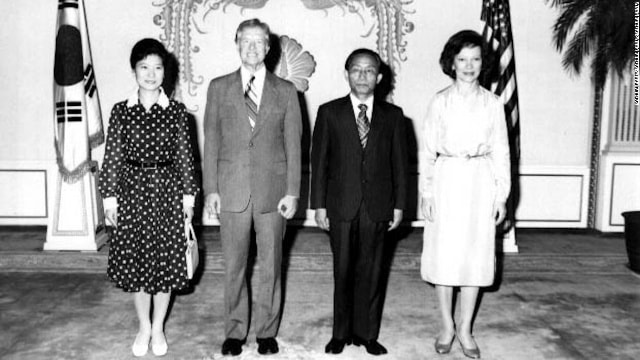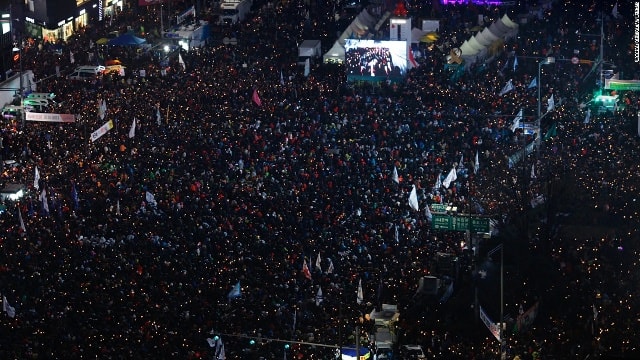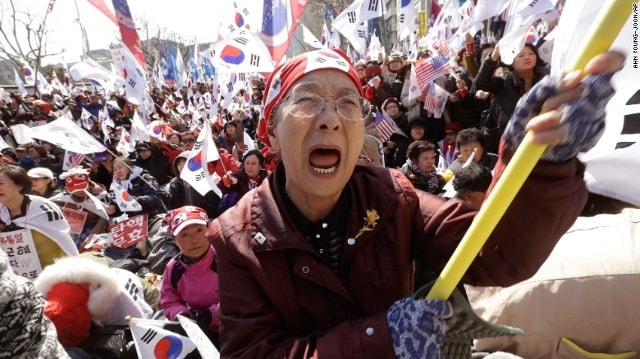Park Geun-hye: 'Princess' out of favor
(Baonghean.vn) - Park Geun-hye - the first president of South Korea to be impeached spent her youth and later years attached to the Blue House. Looking back, the life of the Korean "princess" although lived in luxury but not without tragedy and scandal.
 |
| Park was considered the First Lady of South Korea after her mother died in 1974. Photo: Saenuri Party. |
First Lady
Park first moved into the presidential residence at the age of 10, after his father Park Chung-hee took power in a military coup in 1961.
In 1974, Park's mother died in an assassination attempt on her father. In the following years, Park Geun-hye assumed the role of First Lady, taking over her late mother's diplomatic duties, appearing with her father at receptions for world leaders. These were also Park's first lessons in how to run a country.
“My mother passed away suddenly… the responsibility of First Lady suddenly fell on me, a really difficult task,” she told CNN in 2014.
Five years after her mother’s death, her father, Park Chung-hee, was assassinated. With no parents or home, Park no longer appeared in public much, returning to what she described as a “very normal” life.
Park said she wanted to return to politics after witnessing the effects of the Asian economic crisis in the late 1990s. However, with her family background, the path to power seemed not to be easy for this woman. In 2006, she was attacked while campaigning ahead of local elections in Seoul, but she still did not give up political activities, eventually being elected President and returning to the Blue House in 2013, decades after her parents passed away.
 |
| Hundreds of thousands of people took to the streets to protest against Park. Photo: Getty. |
Ferry disaster
Park became the first female leader in a deeply patriarchal South Korean society, offering glimmers of hope for gender equality. Her work style also reminded many of her late father.
“According to aides, her style of governance is reminiscent of Park Chung-hee, more authoritarian than what South Korea is used to in today's 21st-century democracy,” said Duyeon Kim at Georgetown University.
Just over a year after taking office, tragedy struck again.
On April 16, 2014, a passenger ferry sank off the coast of South Korea. The entire country watched in horror on live news reports as hundreds of passengers, most of them high school students on a field trip to Jeju Island, drowned.
A total of 304 people died, and it was soon discovered that the cause of the ferry sinking was human error. It was not until seven hours after the tragedy that Park addressed the nation.
“It was a stain on her tenure,” said John Delury, a professor at Seoul’s Yonsei University. “People felt she was not there at the time. It wasn’t that people expected her to miraculously save the ferry, but they needed leadership.”
 |
| A supporter of Ms. Park cries during a protest against the president's impeachment. Photo: AP. |
Corruption scandal
“I believe everyone should value trust and confidence above all else,” Park said shortly before the Sewol ferry disaster.
However, if the ferry sinking has shaken people's trust in the president, the growing corruption scandal that has been exposed since last year - dividing and paralyzing the country's political activities - has been the "last straw" for millions of South Koreans.
Since the death of Ms. Park's mother, many questions have been raised about the influence of a cult leader, Choi Tae-min, on the then young and inexperienced First Lady.
A 2007 secret US diplomatic cable released by Wikileaks referred to rumors that Choi had “complete physical and mental control over Park during his formative years and his children, thereby amassing enormous wealth.”
In October last year, it was discovered that Choi Soon-sil, one of Choi Tae-min's children, had been a close friend of President Park for decades. She is currently under investigation for meddling in state affairs and blackmail, but she has consistently denied all charges.
After a three-month investigation by special prosecutors, Park was recommended for indictment on bribery charges after she lost presidential immunity.
Calls for Park's impeachment came quickly and heavily after she made a brief apology on television, making it clear that she would not resign because she did not believe she had made any mistakes.
Hundreds of thousands of protesters thronged central Seoul over the weekend, braving the bitter cold of South Korea's harsh winter, while protests calling for Park's removal took place on a much smaller scale.
Park's subsequent apologies fell largely on deaf ears, and months of political paralysis and divided protests followed.
On March 10, the Constitutional Court of South Korea unanimously ruled to permanently remove Park from office, upholding the National Assembly's vote to impeach her.
Then, in 60 days, elections will be held to choose a new leader for the Korean ship, and Ms. Park’s Saenuri Party still hopes to maintain power despite the scandal. But the woman who has spent most of her life in and out of the Blue House will have to leave it once again, and this time for good.
Thu Giang
(According to CNN)
| RELATED NEWS |
|---|
